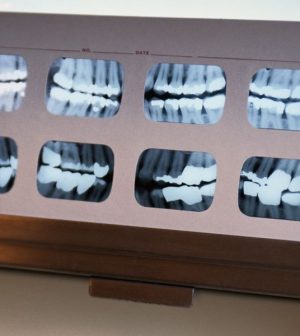- The Best Time of Day to Drink Bone Broth to Maximize Health Benefits
- 8 Ways to Increase Dopamine Naturally
- 7 Best Breads for Maintaining Stable Blood Sugar
- Gelatin vs. Collagen: Which is Best for Skin, Nails, and Joints?
- The Long-Term Effects of Daily Turmeric Supplements on Liver Health
- Could Your Grocery Store Meat Be Causing Recurring UTIs?
- Are You Making This Expensive Thermostat Error This Winter?
- Recognizing the Signs of Hypothyroidism
- 10 Strategies to Overcome Insomnia
- Could Artificial Sweeteners Be Aging the Brain Faster?
Tense Times Mean More Tooth-Grinding, Dentists Warn

If pandemic-related stress has you grinding your teeth, you’re not alone.
Dentists say tooth-grinding and jaw-clenching are on the rise due to the many challenges stemming from the COVID-19 pandemic.
“We’ve been seeing an increase in the number of patients looking for appointments to replace broken mouth guards” that have been cracked or chewed through, said Dr. Leopoldo Correa, director of the Craniofacial Pain Center at Tufts University School of Dental Medicine, in Boston.
Grinding and clenching (“bruxism”) can cause cracked teeth, fillings and crowns; migraines and other headaches; face, neck and jaw pain.
“You may resolve a stressful situation in the short term, or it may continue and develop into chronic stress,” which can result in symptoms such as fatigue, increased muscle tension, depression, an inability to fall or stay asleep, and bruxism, Correa said.
“According to some data, the amount of force we create when clenching the jaw is around 300 pounds,” he said in a school news release.
Five to 10 minutes of jaw and face exercise each day can help you cope, Correa suggested.
Here’s what to do: Keep your teeth apart, bend your fingers and place your knuckles on each side of your face. Give yourself a self-massage, pushing down. If possible, briefly apply heat or an ice pack to the side of the face before doing the stretching exercise.
Correa recommends doing this 5- to 10-minute workout in the morning, but especially in the afternoon or at the end of the workday, when the muscles are most fatigued.
He added that you may need a mouth guard to separate your teeth and help prevent tooth fracture. The guard may also reduce face or jaw pain.
Though over-the-counter mouth guards are available, your dentist can custom-fit one for your mouth size and symptoms, Correa said.
Dental insurance covers some types of mouth guards. Depending on the diagnosis, they may even be covered under medical insurance, according to the news release.
More information
The American Dental Association has more on teeth grinding.
SOURCE: Tufts University, news release
Source: HealthDay
Copyright © 2026 HealthDay. All rights reserved.










